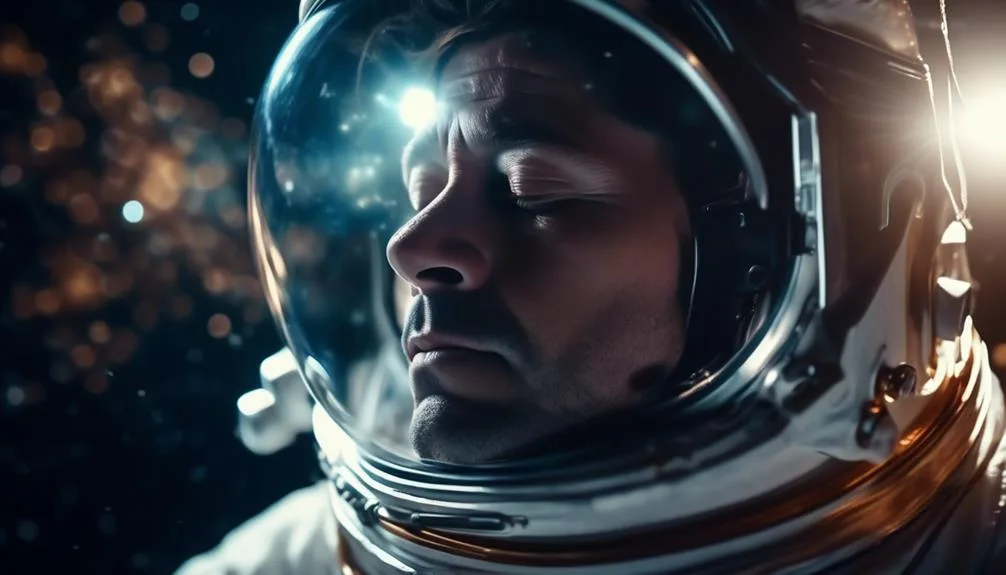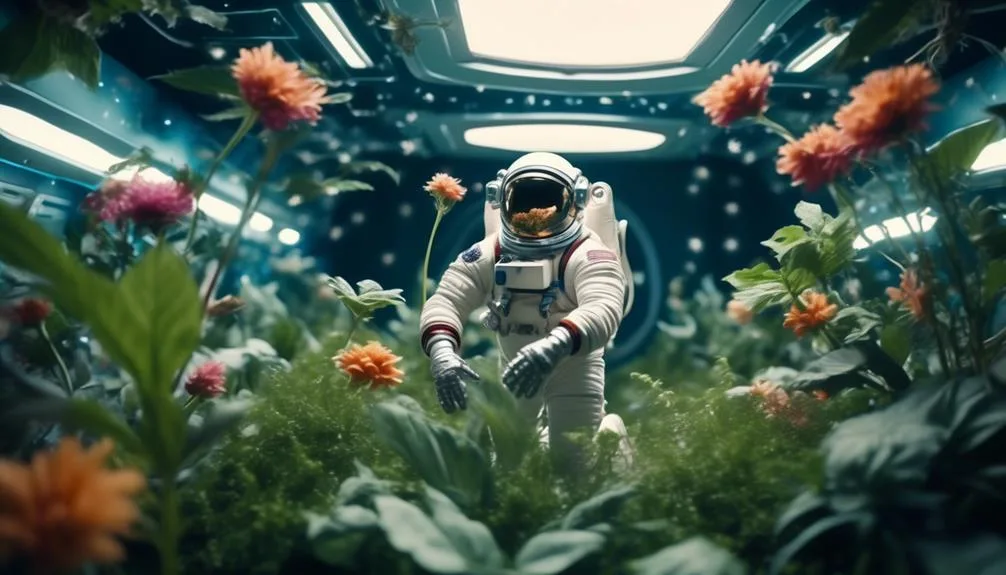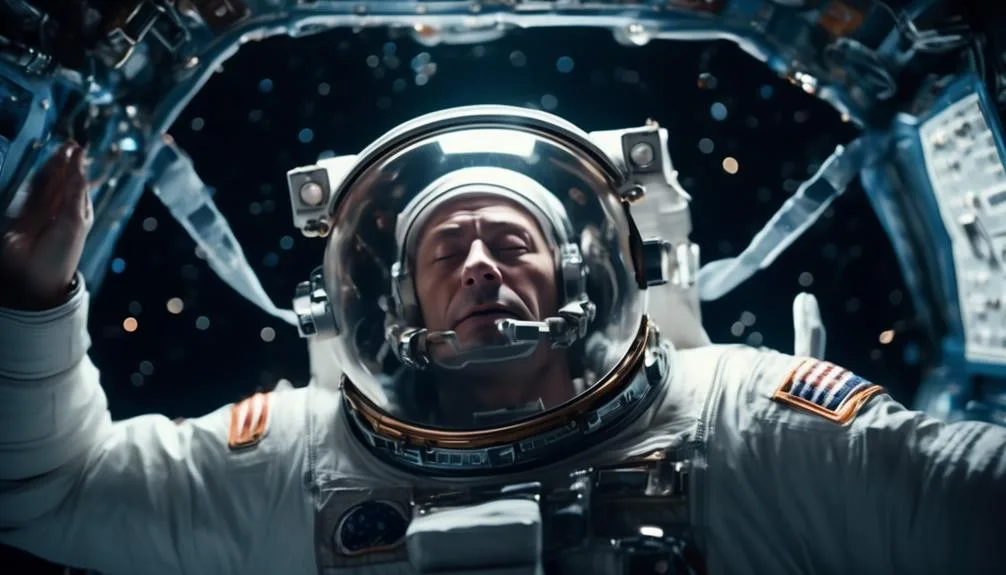Embarking on a journey to the final frontier requires more than just technical expertise and physical training. As an astronaut, you understand the immense challenges that come with exploring space, both physically and mentally.
That's why there is growing recognition of the need to adopt mindfulness techniques to support astronauts in their mission. By cultivating a mindful approach, astronauts can develop the mental resilience necessary to navigate the unique demands of space exploration.
But how exactly can mindfulness help in this extraordinary endeavor? The answer lies in the potential to enhance well-being, manage stress, and improve overall astronaut performance.
So, let's explore the intriguing world of mindfulness and its application for astronauts in their quest beyond Earth's boundaries.
Key Takeaways
- Mindfulness provides astronauts with mental and emotional tools to navigate challenges in space.
- Regular physical exercise promotes mental and emotional well-being.
- Coping mechanisms for isolation include maintaining communication with support systems on Earth.
- Implementing mindfulness practices optimizes mental well-being and cognitive performance in the isolated and high-stress environment of space.
The Importance of Mindfulness in Space Exploration

Mindfulness plays a crucial role in space exploration, providing astronauts with the mental and emotional tools necessary to navigate the challenges and complexities of living and working in the unique environment of outer space.
The benefits of mindfulness for space travel are multifaceted. Firstly, it helps astronauts manage stress and anxiety, which are common in high-pressure situations. Mindfulness techniques such as deep breathing and meditation allow astronauts to stay calm and focused, enhancing their ability to make clear decisions and problem-solve effectively.
Secondly, mindfulness promotes the mind-body connection in space exploration. Being aware of their physical sensations, astronauts can detect changes in their bodies and address them promptly to prevent health issues.
Furthermore, mindfulness helps astronauts maintain a positive mental state, fostering resilience and reducing the risk of depression and isolation.
Enhancing Mental Resilience for Astronauts

To further equip astronauts for the challenges of space exploration, a focus on enhancing their mental resilience becomes paramount. Building emotional resilience is crucial for astronauts as they face the isolation, confinement, and high-stress environments of space. Promoting self-care and mindfulness techniques can help astronauts maintain their mental well-being and cope with the demands of their mission.
Here are five key strategies to enhance mental resilience for astronauts:
- Developing a daily mindfulness practice to cultivate present-moment awareness and reduce stress.
- Engaging in regular physical exercise to promote mental and emotional well-being.
- Practicing effective communication and teamwork skills to foster positive relationships and support systems.
- Participating in regular debriefing sessions to process emotions and reflect on experiences.
- Utilizing relaxation techniques, such as deep breathing exercises, to manage anxiety and promote relaxation.
Managing Stress in Long-Duration Space Missions

Managing stress in long-duration space missions requires a comprehensive approach that addresses the unique challenges and demands astronauts face in this environment.
Coping mechanisms for isolation in space missions and strategies for maintaining psychological well-being in long-duration space travel play a crucial role in managing stress.
Isolation in space can lead to feelings of loneliness, boredom, and a lack of social support. To cope with isolation, astronauts are encouraged to maintain regular communication with their support systems on Earth, engage in activities that provide a sense of purpose and fulfillment, and establish a daily routine that includes both work and leisure time.
Additionally, strategies such as mindfulness meditation, cognitive-behavioral therapy, and virtual reality therapy have been explored to help astronauts manage stress and maintain psychological well-being in the challenging conditions of long-duration space missions.
Improving Physical and Mental Well-being in Space

Improving physical and mental well-being in space requires a comprehensive approach that addresses the unique challenges and demands faced by astronauts in this environment. To maintain bone density and combat muscle atrophy, astronauts must engage in specific activities and adhere to a strict regimen.
Here are five key strategies employed to enhance physical and mental well-being in space:
- Regular exercise: Astronauts engage in a variety of exercises, including resistance training and cardiovascular activities, to stimulate muscle growth and maintain bone density.
- Nutritional supplementation: A carefully planned diet, supplemented with nutrients like calcium and vitamin D, helps astronauts meet their nutritional needs and support bone health.
- Physical therapy: Specialized techniques, such as resistance training and vibration therapy, help counteract muscle atrophy and improve muscle strength.
- Psychological support: Astronauts receive counseling and mental health resources to address the psychological challenges of isolation and confinement in space.
- Sleep management: Strategies to optimize sleep quality, such as maintaining a regular sleep schedule and creating a conducive sleeping environment, are implemented to promote mental well-being.
Implementing Mindfulness Techniques for Astronauts

In order to optimize the mental well-being and cognitive performance of astronauts in space, the implementation of mindfulness techniques becomes crucial. Implementing mindfulness practices, such as meditation and focus exercises, can provide numerous benefits for astronauts during their space missions.
Meditation techniques, including mindfulness-based stress reduction (MBSR), can help astronauts manage stress, enhance their emotional well-being, and improve their ability to focus and concentrate. By practicing mindfulness, astronauts can develop a heightened sense of self-awareness and a greater ability to regulate their emotions and thoughts, which are essential for maintaining psychological well-being in the isolated and high-stress environment of space.
Furthermore, mindfulness practices can enhance cognitive functions such as attention, memory, and decision-making, thus contributing to the overall success of space missions.
Frequently Asked Questions
How Does Mindfulness Help Astronauts in Dealing With the Physical Challenges of Space Travel?
Mindfulness helps you, as an astronaut, deal with the physical challenges of space travel by strengthening the mind-body connection and enhancing stress management. It allows you to stay focused, calm, and resilient in the face of adversity.
Can Mindfulness Techniques Be Used to Improve Astronauts' Cognitive Performance?
Mindfulness techniques can improve astronauts' cognitive performance by enhancing focus and reducing stress. By training the mind to be present and aware, astronauts can navigate the challenges of space travel with heightened clarity and resilience.
Are There Any Specific Mindfulness Techniques That Are More Effective for Astronauts?
There are specific mindfulness techniques that can be more effective for astronauts. Mindfulness techniques for stress management can help them cope with the demands of space travel, while mindfulness techniques for sleep improvement can enhance their rest and recovery.
How Do Astronauts Practice Mindfulness in the Unique Environment of Space?
In the unique environment of space, astronauts practice mindfulness techniques to maintain their mental well-being and cope with isolation. They use visualizations, breathing exercises, and body scans to stay grounded and focused on their mission.
What Are Some Potential Challenges or Barriers to Implementing Mindfulness Techniques for Astronauts?
Time constraints and limited resources pose potential challenges to implementing mindfulness techniques for astronauts. Adapting these techniques to the unique environment of space may require innovative approaches to ensure their effectiveness and practicality.
Conclusion
In conclusion, adopting mindfulness techniques for astronauts is crucial for their mental resilience and well-being in the challenging environment of space exploration.
By integrating mindfulness practices into their training and daily routines, astronauts can effectively manage stress and enhance their overall physical and mental health.
Just as a sturdy spacesuit protects astronauts from the harsh conditions of space, mindfulness acts as a protective shield, safeguarding their minds and allowing them to navigate the final frontier with greater ease and clarity.

